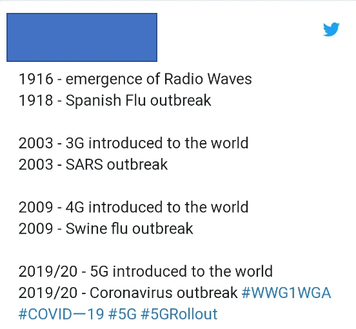 Jacquelyn Schreck - Human Factors Engineer - Intern Jacquelyn Schreck - Human Factors Engineer - Intern With major events and/or crises there often comes misinformation, fake news, and conspiracy theories. No matter how outrageous, such as 9/11 being an inside job or lizard people infiltrating the government and the entertainment industry by holding high power positions, there are people who will buy-in. Unfortunately, the COVID-19 global health crisis is no exception when it comes to misinformation and conspiracy theories. In March 2020, a poll conducted by the Pew Research Center was taken by American adults asking how they believed the virus started. Out of 9,000 adults, only 43% believed it was natural (i.e., not man-made), 23% believed it was intentionally man-made, 6% believed it was man-made but unintentional, and 1% didn’t believe the Coronavirus existed at all (that’s 90 people!). There was no information on the remaining 27%, but it’s likely that this indicates the amount of people who didn’t respond. Regardless, based on these results, it appears that people are not only misinformed but uninformed as well. Currently, there is no remedy or cure for COVID-19 (no, drinking cleaning supplies, such as bleach, is NOT one), but there is a remedy for misinformation – critical thinking. According to the Foundation for Critical Thinking , it is a “mode of thinking - about any subject, content, or problem - in which the thinker improves the quality of his or her thinking by skillfully taking charge of the structures inherent in thinking and imposing intellectual standards upon them.” Please consider applying intellectual standards when evaluating information related to COVID- 19. Though there are multiple COVID-19 conspiracies, the most prolific conspiracy is that the roll-out of 5G signals impacted the Coronavirus. Some theories are that it weakens the immune system making the virus harder to fight off, it’s the government using the lock-down to install networks, and my personal favorite, it’s an Illuminati mass-murder plot. “Experts” have made claims about 5G as well. For example, according to a physician in California, the Coronavirus is the effect of poison from 5G. Another expert offered the counterargument that 5G waves are too similar to already-existing electromagnetic waves to be the cause of a pandemic. Of course, we cannot ignore the fact that electromagnetic waves are not viruses – science. In cases like these, it is necessary to scrutinize the level of expertise and the information presented. Always seek multiple sources of information, consider the basis of the information provided, the motivation of the person, and the benefits they would gain from your compliance. It is also important to remember that correlation does not equal causation. In the image below, a Twitter user is trying to make an argument that new advancements in radio waves precedes major pandemics. People are increasingly spending time on, and getting their news from, social media. While often criticized for spreading false information, social media has demonstrated awareness of false information about COVID-19 and is working on finding ways to combat it. TikTok, for instance, has partnered with the World Health Organization (WHO) to help disperse accurate and helpful tips to its users. One TikTok from WHO shows how to properly use a facemask. TikTok isn’t the only media source combatting misinformation. Facebook, YouTube, Twitter, and more have been called out about the spreading of fake news and the lack of moderation on their platforms and have since made claims explaining how they have taken action. Facebook is using fact checkers and flagging false information. YouTube and Twitter will be relying more heavily on artificial intelligence and machine learning to monitor their platforms by automatically hiding content deemed harmful by the algorithm.
While it is important to remain open-minded and consider all points of view, it is also important to scrutinize and be skeptical of the information that is being given to the general public. If something sounds off, it just may be, so take the time to examine it further. Fact check, identify reliable sources, and be aware of your own potential errors in decision making and opinions. This barely scratches the surface of what is happening with fake news, conspiracies, and more, but to sum up, please refrain from drinking bleach.
0 Comments
 Jennifer Murphy, Ph.D., Founder & CEO Jennifer Murphy, Ph.D., Founder & CEO If we all remember one thing from the COVID-19 outbreak of 2020, it will be the Great TP Crisis that gripped the entire planet. Of all things we could be doing to hunker down, this is easily the least rational, but also the most meme-worthy. What is wrong with us? There are so many psychological phenomena that come into play in a crisis like a pandemic, you could write a book on them, but we're going to frame the TP Crisis using a contrived situation often used to research decision-making in social contexts called the "prisoner's dilemma." In this situation, two people are separated and given the following scenario: You are a member of a gang. The prosecutors have charged you with a serious offense, but only have enough evidence to convict you of a lesser one. You have been offered a deal wherein you can testify that the other committed the more serious offense. Alternatively, you can remain silent. The possible outcomes are: 1. If you and the other member betray each other, both of you will serve 2 years in prison. 2. If one of you rats out the other, that one will be set free, and the other will serve 3 years in prison. 3. If neither of you rat out the other, both of you will serve 1 year in prison. What do you do? The "right" answer, from a self-preservation perspective, is to rat your partner out. Sure, you might have to do 2 years in prison, but it avoids the worst possible scenario. To put this in toilet paper terms: Let's say you normally buy enough TP to last a month, but because this is an emergency, you want to make sure you have enough for several months. Regardless of how everyone else behaves, it's in your personal best interest to hoard it. If other people are panic buying, there will be less for you, and if other people are not panic buying, then more TP for you! When placed in an experimental setting and given one chance to play this game, most people will make a rational choice and buy too much TP. In these situations, participants are told they don't know the other person, and that person will never be able to retaliate. However, when people are asked to play out this scenario over multiple instances with feedback about how the other person responded, cooperative behavior begins to emerge. This paradigm, the "iterative prisoner's dilemma," has been used to study cooperative and altruistic behavior. In these cases, the best case scenario is usually a "tit for tat" strategy in which case you do whatever the other player does on the previous round. However, that depends upon what the other person does. Winning the long game requires paying attention to their strategy and predicting their next move, which is not something any of us have the capacity to do in a toilet paper crisis scenario.
What's the takeaway here? Hoarding TP is not in everyone else's best interest, but it certainly is in yours at least in the short term from a game theory perspective. I'm not endorsing hoarding anything, but of all the seemingly irrational things you could do during these unprecedented times, if you find yourself with the urge to panic buy TP, at least you know you're not totally nuts for doing it. |
AuthorsThese posts are written or shared by QIC team members. We find this stuff interesting, exciting, and totally awesome! We hope you do too! Categories
All
Archives
June 2024
|



 RSS Feed
RSS Feed